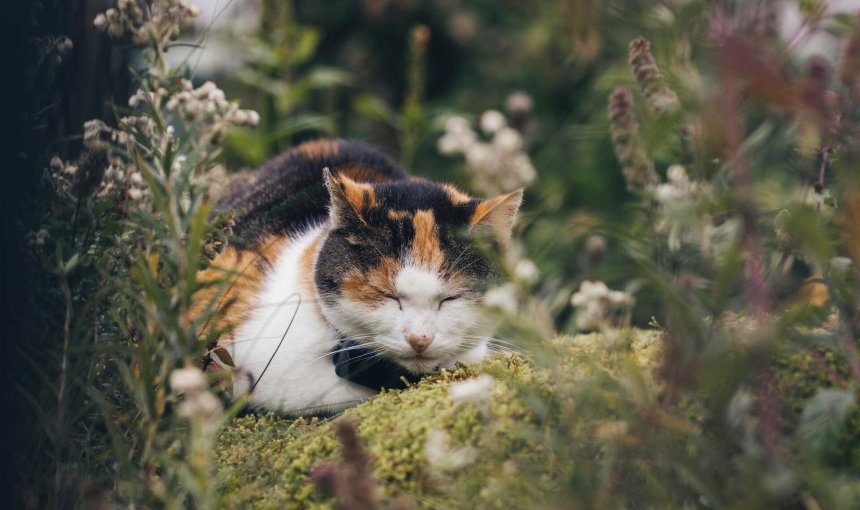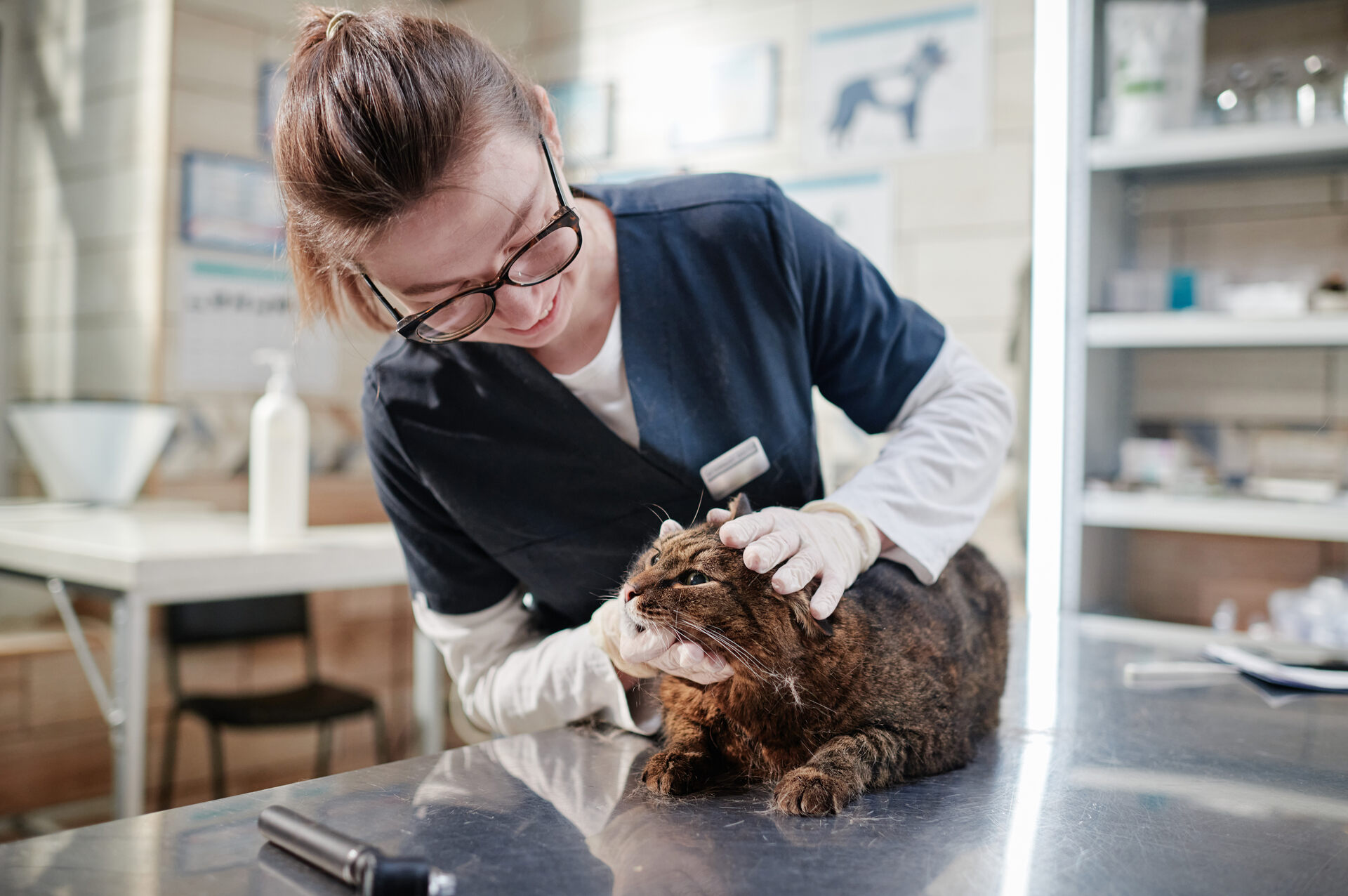 Approved by Dr. Dwight Alleyne, DVM
Approved by Dr. Dwight Alleyne, DVM Cat Pollen Allergy? Here’s How To Deal With It
Dealing with the seasonal sniffles is never fun - especially if you've got a cat pollen allergy at hand! Here's why it happens & what to do - including tracking where your cat's coming in contact with pollen in the first place.

As ‘sniffle season’ approaches, you’ll find it’s not too uncommon your cat develops it as well. Here are a couple of tips and tricks on how to deal with a cat pollen allergy – including tracking if your cat’s been wandering to any pollen-riddled spots around town.
Key Takeaways
Your cat can get a pollen allergy, which can cause symptoms like watery eyes, a runny nose, sneezing, coughing, and even hair loss from scratching or rubbing their skin too much.
The best way to help your cat is to figure out what they are allergic to. Then, try to keep them away from that specific pollen. This might mean keeping them inside when the pollen count is high or only opening windows at night.
If your cat wears a Tractive smart cat collar, you can check where they’ve been wandering outside. This can help you figure out if they’ve been spending time in “high pollen zones” so you can help them avoid those spots and feel better.

Find out where your cat spends their time.
Read moreUnderstanding cat pollen allergies
An allergy causes the body to react to certain substances in the same way it reacts to diseases. (Applying to cats and humans alike.) So when your cat comes in contact with an allergy-triggering substance, their immune system produces antibodies as a defensive reaction. This includes a substance called histamine, which helps fight disease – but unfortunately, also might turn up as swelling, itching, watery eyes, and a runny nose.
For some cats, you might find them sniffling and itching more often around springtime – when pollen is in the air. This fine, powdery substance gets secreted by seed-producing plants for reproduction around this time.
What plants might trigger an allergic reaction in cats?
Cats might nibble on grass every so often or wander around your garden, coming in contact with flowers and plants everywhere. Any amount of pollen or even parts of certain plants might end up brushing against their fur or paws. (And can make them sick while grooming.) Which is why it makes sense to stay aware of what plants are poisonous to cats – and keep them well away from your buddy. Some include:
- Daffodils
- Tulips
- Lilies
- Peonies
- Ragwort
- Foxglove
- Chrysanthemums
- Hyacinths
This is why it makes sense figure out what spots around your neighborhood your cat likes to hang out in most. It can help you figure out whether these fall into “high pollen” zones or not.

Track your cat wherever they go
Get real-time location information, wherever they go. Find out when they go somewhere they shouldn’t, with Virtual Fences. And discover their favorite spots with Territory.
What areas have a higher pollen count than others?
In the US alone, different states may be more likely to be “allergy zones” – others less so. So if you’re planning on moving states or visiting one with your cat, keep an eye out for its pollen count this spring – and plan ahead how you’re going to prevent and/or treat it.
| High-pollen US states | Low-pollen US states |
| Kansas | Utah |
| Texas | Arizona |
| Missouri | Colorado |
| Iowa | California |
| Oklahoma | Washington |
| Pennsylvania | New York |
| Florida | Ohio |
| South Carolina | Michigan |
| North Carolina | New Mexico |
Does my cat have a pollen allergy?
Just like humans, a cat pollen allergy may also turn up with symptoms similar to ours. Get in touch with your vet, if your cat shows signs of:
- Watery eyes
- Running nose
- Head shaking
- Sneezing
- Coughing
- Hair loss due to overgrooming, or excessive rubbing or scratching at their fur, skin, or ears
- Chewing on their paws
- Vomiting or throwing up hairballs
- Sores on their skin
Just remember: it’s important to give your vet a full history of these symptoms. So keep track of how long they’ve been persisting and whether it’s a seasonal occurrence.
Do cat allergies get worse in summer?
For many cats, yes, allergies can definitely get worse in the summer. Summer is peak season for grass and weed pollen. Even if your cat is strictly indoors, all that pollen is carried in on breezes through open windows, and, more commonly, on your clothes and shoes. The higher the pollen count outside, the higher the chances your cat is exposed inside.
Cats that spend time outside are exposed to more environmental allergens – like specific grasses, molds, and insect bites – in the summer compared to the colder months when they might stay closer to home. So, if you notice your cat scratching more, losing fur, or over-grooming as the weather heats up, a seasonal allergy flare-up is very likely the cause.
⚠️ Some plants – like ragweed and mugwort – can also release pollen well into the fall months. So it’s not just spring and summer to watch out for!
Can indoor cats be allergic to pollen?
Yes, absolutely. It’s a common belief that keeping a cat indoors completely shields them from outdoor allergens like pollen, but unfortunately, that’s not the case. Pollen is a microscopic powder that is incredibly good at traveling. Your indoor cat might be coming in contact with it…
- From you.
The most common way pollen gets inside is by hitching a ride on you! Pollen sticks to your clothes, hair, and shoes every time you come inside, and you track it right into your home where your cat lives. - Open windows and doors.
While screens help keep bugs out, they don’t block the tiny pollen particles that float in on the breeze whenever you open a window or door for fresh air. - Air vents and filters.
Pollen can also be drawn in through your home’s ventilation system, especially if you live in a multi-unit building or if your air filters aren’t changed regularly.
When an indoor cat is allergic, they react to this pollen buildup just like they would to dust or a food ingredient. Instead of sneezing like a person, a cat with pollen allergies often shows signs like itchy skin, excessive scratching, fur loss, and skin irritation. So, while you’re doing a great job keeping your cat safe indoors, you may still need to manage their environment and talk to your vet about seasonal allergies.
What to expect at your vet
Now before you head over to your vet’s, you’ll find it helpful going prepared to answer:
- When did your cat’s symptoms first appear?
- Has your cat had them before?
- Did you make any changes to the cat’s food, outdoor privileges or other routines recently?
- Is your cat primarily an indoor or outdoor cat? How often do they head outdoors?
Besides thoroughly examining your cat to rule out pests like ticks or mites, your vet might also check for symptoms like a cold or food allergies.

Once your vet has ruled out these causes, they might also conduct a blood test to check for antibodies, just like in a human allergy test. From this, they should be able to not only tell you if your cat has a pollen allergy but also what specific types of pollen your cat is allergic to.
Based on what’s causing your cat’s pollen allergy, your vet might prescribe you specific medications to help reduce the histamines in their body. (And reduce the itching, sneezing, and swelling.) Make sure to follow their instructions to the T through the full course of medication – even if your cat seems to be getting better early on.
How to help your cat avoid contact with allergens
First things first, get informed. Check out your local pollen calendar to figure out what time of year which plants usually bloom. Many meteorological societies measure the pollen in the air daily and provide accurate live information on how much of which allergen is currently in the air at your location.
You’re also in good hands knowing when your cat might be in danger of an allergic reaction.
So you can either keep them indoors or keep medication ready to give them some relief. If you choose to keep your cat inside while the pollen they are allergic to is outside, take extra care when airing your home.
A final tip: avoid airing out your indoors in the mornings. Most seed and pollen producing plants bloom during the day, so you can significantly help your cat by only opening windows after sunset.
Where a smart cat collar can help
Your outdoor cat might be wandering in a mile-long radius – likely coming in contact with your neighbors’ pollen-riddled backyards, the local park, or even a patch of woodland nearby. Even your indoor cat might come in contact with allergy-inducing pollen, ticks, or mites from your very own backyard. A Tractive smart cat collar can help you figure out where the problem is coming from.
Strapped to your cat’s collar, you can now:
Figure out where your cat is running into pollen
While much of the pollen comes in on your clothes, outdoor cats are constantly encountering high-pollen areas, like certain overgrown gardens or fields. From your Tractive app, you can check their Location History to see exactly where your cat spends their time. The Heatmap will highlight any bushy or grassy spots where they might be rubbing against plants with high pollen counts. If you find a pattern, you can take action – by either clearing the area (if it’s your yard) or trying to redirect your cat away from that location.

Spot potential health issues early
Intense itchiness (a main symptom of pollen allergy) will prevent your cat from getting restful sleep. With its built-in motion detector, your Tractive tracker also monitors their activity and sleep quality. You might not see them scratching all night, but the data will show you if their sleep is broken and poor. Or if they’re so uncomfortable they become lethargic, the tracker will pick up on that drop in activity.
If the allergic reaction causes a major, sudden shift in their activity or sleep pattern, you’ll receive an instant Health Alert on your phone. This info can help your vet diagnose them better, as it gives them concrete data, helping them fine-tune the right treatment.
Your furry friend’s health and wellbeing means as much as to us as it does to you. So we’ve made it a priority to only share medically-relevant content on our blog. This post was checked, double-checked, and medically verified by Georgia-based vet, Dr. Dwight Alleyne.

Dr. Dwight Alleyne, DVM
Originally from Long Island, New York, Dr. Alleyne began his career at a no-kill animal shelter before becoming a licensed veterinary technician. He graduated from Cornell University Veterinary College in 2006 and completed an internship at Purdue University. Now practicing in Georgia, Dr. Alleyne specializes in soft tissue surgery and ultrasounds. He also writes pet health articles on his website, “The Animal Doctor Blog” (www.anmldrblog.com).




